Why Rust’s Ecosystem is a Game-Changer for Developers
Introduction In the programming world, Rust has garnered significant attention for its focus on memory safety, performance, and concurrency. However, there’s one often-overlooked aspect that sets Rust apart from C++—its ecosystem. While many discussions focus on the language’s inherent features, I want to highlight why Rust’s ecosystem is a major advantage over C++’s fragmented tooling. This post will delve into the simplicity, efficiency, and developer productivity that Rust’s ecosystem offers compared to C++’s traditional, tool-heavy workflow. 1. Unified Tooling with Cargo vs C++’s Fragmented Tooling C++ developers are used to managing multiple tools for different aspects of the development process: • CMake for building projects • Make/Ninja for handling build systems • Conan or vcpkg for dependency management • Clang-Tidy for static analysis • GoogleTest for testing This fragmentation requires developers to learn different configurations, tools, and workflows, often leading to inefficiencies and confusion when switching between projects or teams. On the other hand, Rust provides a unified, all-in-one solution through Cargo. Cargo handles: • Dependency management: Automatically resolving and locking versions • Building projects: Seamless compilation with cargo build • Testing: Built-in unit tests with cargo test • Documentation: Automatically generating docs with cargo doc • Benchmarking: Support for benchmarking via cargo bench This simplicity means Rust developers can focus on writing code, not managing multiple tools and configurations. C++ Toolchain vs Rust + Cargo Compiler & Build System Feature C++ (GCC/Clang, CMake, Make/Ninja) Rust (Cargo) Compiler GCC / Clang rustc (LLVM-based) Build System CMake + Make/Ninja (external) Built-in via Cargo Ease of Use Moderate to complex Very easy Incremental Build Supported via Ninja Built-in and efficient Cross Compilation Toolchain files required Built-in support (--target) Static Analysis & Linting Feature C++ Rust Linters Clang-Tidy, cppcheck (external) cargo clippy (built-in) Warnings as Errors Via compiler flags (e.g., -Werror) Built-in via Clippy and compiler Code Formatting clang-format rustfmt (built-in) Dependency Management Feature C++ Rust Package Manager Conan, vcpkg (external) Cargo (integrated) Dependency Resolution Manual, versioning complex Automatic, lockfile-based Binary Caching Supported via Conan Shared cache built-in Memory Safety & Debugging Feature C++ Rust Memory Safety Manual, error-prone Safe by design Runtime Debug Tools Valgrind, ASan, UBSan Miri, compiler-enforced checks Thread Safety Manual Enforced via ownership model Tooling & Ecosystem Feature C++ Rust Documentation Doxygen, custom cargo doc (built-in) Testing Manual (e.g., GoogleTest) Built-in Benchmarking Google Benchmark Criterion.rs Code Coverage gcov, lcov (manual setup) cargo tarpaulin IDE Support Feature C++ Rust VS Code Support Good with Clangd, CMake Tools Excellent with rust-analyzer IntelliSense Needs configuration Automatic via rust-analyzer Debugging GDB/LLDB GDB/LLDB Summary Category C++ Toolchain Rust + Cargo Complexity High (fragmented tooling) Low (unified toolchain) Safety Manual effort Enforced by design Performance Excellent, mature compilers Comparable, improving Ecosystem Integration Fragmented Cohesive (Cargo-centric) Learning Curve Steep Moderate 2. Seamless Dependency Management In C++, managing dependencies is notoriously complex. Often, developers have to manually set up dependencies, configure them for different platforms, and ensure proper versions across the entire project. This can lead to version conflicts, incompatibilities, or outright dependency hell. Rust takes a radically different approach with Cargo, which automates dependency resolution. With Cargo, all dependencies are managed through a simple configuration file (Cargo.toml), and a lockfile (Cargo.lock) ensures that the exact same versions of dependencies are used across all environments. This automated process reduces the risk of conflicts and makes it far easier to collaborate on projects, regardless of the platform or the developer’s experience level. 3. Built-in Code Formatting and Linting: Rust’s Focus on Code Quality C++ developers often rely on external tools such as clang-format and clang-tidy for code formatting and linting, each requiring separate configuration and setup. These tools are powerful, but they also introduce friction when starting a new project or when working in a team. Rust, by contrast, has rustfmt and cargo clippy, which are tightly integrated into the development workflow. These tools automatically ensure that code is consistently formatted and adheres to best pract
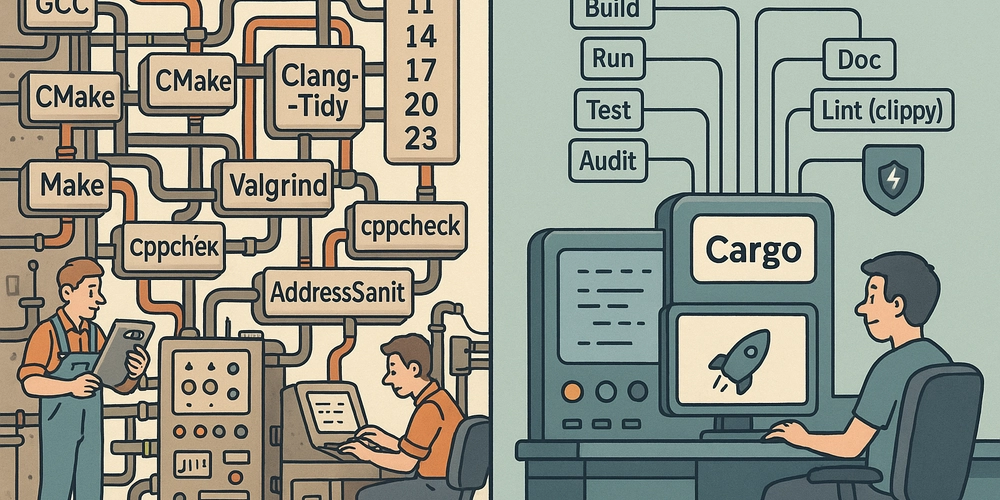
Introduction
In the programming world, Rust has garnered significant attention for its focus on memory safety, performance, and concurrency. However, there’s one often-overlooked aspect that sets Rust apart from C++—its ecosystem. While many discussions focus on the language’s inherent features, I want to highlight why Rust’s ecosystem is a major advantage over C++’s fragmented tooling.
This post will delve into the simplicity, efficiency, and developer productivity that Rust’s ecosystem offers compared to C++’s traditional, tool-heavy workflow.
1. Unified Tooling with Cargo vs C++’s Fragmented Tooling
C++ developers are used to managing multiple tools for different aspects of the development process:
• CMake for building projects
• Make/Ninja for handling build systems
• Conan or vcpkg for dependency management
• Clang-Tidy for static analysis
• GoogleTest for testing
This fragmentation requires developers to learn different configurations, tools, and workflows, often leading to inefficiencies and confusion when switching between projects or teams.
On the other hand, Rust provides a unified, all-in-one solution through Cargo. Cargo handles:
• Dependency management: Automatically resolving and locking versions
• Building projects: Seamless compilation with cargo build
• Testing: Built-in unit tests with cargo test
• Documentation: Automatically generating docs with cargo doc
• Benchmarking: Support for benchmarking via cargo bench
This simplicity means Rust developers can focus on writing code, not managing multiple tools and configurations.
C++ Toolchain vs Rust + Cargo
Compiler & Build System
| Feature | C++ (GCC/Clang, CMake, Make/Ninja) | Rust (Cargo) |
|---|---|---|
| Compiler | GCC / Clang | rustc (LLVM-based) |
| Build System | CMake + Make/Ninja (external) | Built-in via Cargo |
| Ease of Use | Moderate to complex | Very easy |
| Incremental Build | Supported via Ninja | Built-in and efficient |
| Cross Compilation | Toolchain files required | Built-in support (--target) |
Static Analysis & Linting
| Feature | C++ | Rust |
|---|---|---|
| Linters | Clang-Tidy, cppcheck (external) |
cargo clippy (built-in) |
| Warnings as Errors | Via compiler flags (e.g., -Werror) |
Built-in via Clippy and compiler |
| Code Formatting | clang-format |
rustfmt (built-in) |
Dependency Management
| Feature | C++ | Rust |
|---|---|---|
| Package Manager | Conan, vcpkg (external) | Cargo (integrated) |
| Dependency Resolution | Manual, versioning complex | Automatic, lockfile-based |
| Binary Caching | Supported via Conan | Shared cache built-in |
Memory Safety & Debugging
| Feature | C++ | Rust |
|---|---|---|
| Memory Safety | Manual, error-prone | Safe by design |
| Runtime Debug Tools | Valgrind, ASan, UBSan | Miri, compiler-enforced checks |
| Thread Safety | Manual | Enforced via ownership model |
Tooling & Ecosystem
| Feature | C++ | Rust |
|---|---|---|
| Documentation | Doxygen, custom |
cargo doc (built-in) |
| Testing | Manual (e.g., GoogleTest) | Built-in |
| Benchmarking | Google Benchmark | Criterion.rs |
| Code Coverage | gcov, lcov (manual setup) | cargo tarpaulin |
IDE Support
| Feature | C++ | Rust |
|---|---|---|
| VS Code Support | Good with Clangd, CMake Tools | Excellent with rust-analyzer
|
| IntelliSense | Needs configuration | Automatic via rust-analyzer
|
| Debugging | GDB/LLDB | GDB/LLDB |
Summary
| Category | C++ Toolchain | Rust + Cargo |
|---|---|---|
| Complexity | High (fragmented tooling) | Low (unified toolchain) |
| Safety | Manual effort | Enforced by design |
| Performance | Excellent, mature compilers | Comparable, improving |
| Ecosystem Integration | Fragmented | Cohesive (Cargo-centric) |
| Learning Curve | Steep | Moderate |
2. Seamless Dependency Management
In C++, managing dependencies is notoriously complex. Often, developers have to manually set up dependencies, configure them for different platforms, and ensure proper versions across the entire project. This can lead to version conflicts, incompatibilities, or outright dependency hell.
Rust takes a radically different approach with Cargo, which automates dependency resolution. With Cargo, all dependencies are managed through a simple configuration file (Cargo.toml), and a lockfile (Cargo.lock) ensures that the exact same versions of dependencies are used across all environments.
This automated process reduces the risk of conflicts and makes it far easier to collaborate on projects, regardless of the platform or the developer’s experience level.
3. Built-in Code Formatting and Linting: Rust’s Focus on Code Quality
C++ developers often rely on external tools such as clang-format and clang-tidy for code formatting and linting, each requiring separate configuration and setup. These tools are powerful, but they also introduce friction when starting a new project or when working in a team.
Rust, by contrast, has rustfmt and cargo clippy, which are tightly integrated into the development workflow. These tools automatically ensure that code is consistently formatted and adheres to best practices, significantly reducing the chances of errors and improving code quality.
Moreover, Clippy offers additional linting to catch common mistakes, and both tools are invoked with just a single command:
cargo fmt
cargo clippy
4. Effortless Testing and Benchmarking with Cargo
Testing is a critical part of any development process, and C++ developers often rely on external libraries like GoogleTest for unit testing, and Google Benchmark for performance testing. Setting up and configuring these tools can be time-consuming and error-prone, especially in large projects.
In Rust, Cargo has built-in support for testing with cargo test, and benchmarking with cargo bench. This ensures that testing is always just a single command away and integrates seamlessly into the development cycle. Since testing and benchmarking are tightly coupled with Cargo, there’s no need for additional setup or dependency management—everything works out of the box.
5. Integrated Documentation
C++ developers often use Doxygen or similar tools to generate documentation. While these tools are powerful, they require additional setup and maintenance, and they might not always be in sync with the code.
Rust has a built-in tool for generating documentation directly from the code comments, which can be easily generated using:
cargo doc
The integration of documentation generation into the build system ensures that your documentation is always up-to-date, making it easy to maintain.
6. The Power of the Rust Community and Ecosystem
While the C++ ecosystem is vast and offers a wealth of libraries, tools, and resources, it is fragmented. Managing multiple build systems, package managers, and external libraries can be time-consuming and error-prone.
In contrast, Rust’s ecosystem is cohesive, centered around Cargo and crates.io—Rust’s official package registry. Whether you’re building web servers with Rocket, working with databases, or performing cryptography tasks, you’ll find libraries available on crates.io with consistent versioning and excellent documentation. The tight integration between Cargo and crates.io ensures that your dependencies are easy to manage, update, and integrate.
7. Cross-Platform Development Made Easy
C++ can target a wide range of platforms, but cross-platform development often requires managing multiple toolchains and handling platform-specific quirks.
Rust, by design, offers first-class cross-platform support. With just a few flags (--target), you can easily build for various platforms, from WebAssembly to embedded systems. Rust’s toolchain is unified across all platforms, meaning developers don’t have to worry about platform-specific configurations.
Conclusion: Why Rust’s Ecosystem is a Major Advantage
While C++ remains a powerful and widely-used language, the fragmented ecosystem requires developers to manage multiple tools, setups, and configurations. By contrast, Rust’s ecosystem, built around Cargo, offers a more unified, streamlined development experience. From dependency management to testing, linting, and documentation generation, everything you need to write, build, and maintain software is integrated into a single tool, making development more efficient and enjoyable.
If you’re looking for a language that provides not only memory safety and performance but also a modern ecosystem that simplifies development, Rust is the clear choice.

















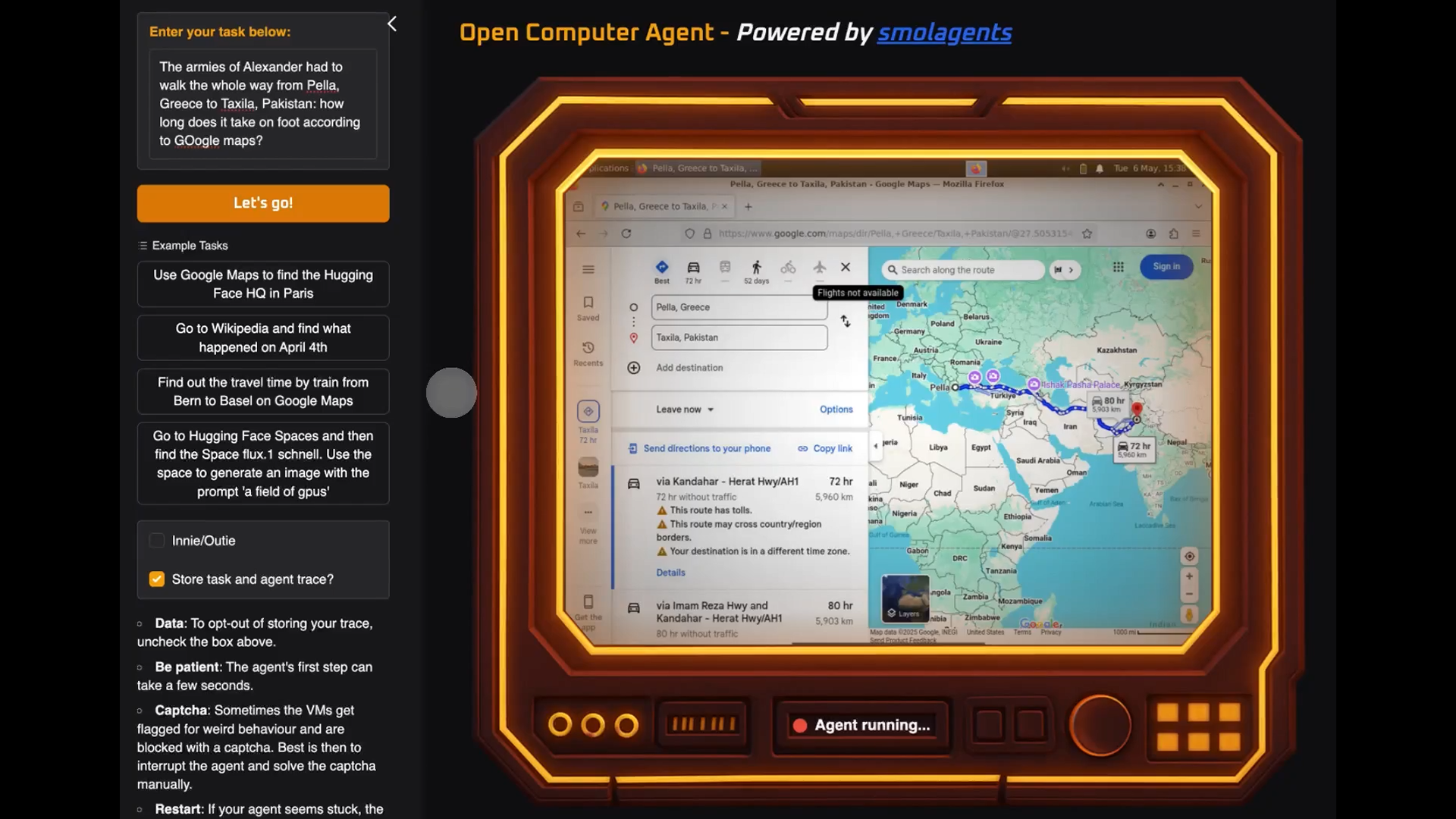
























































































































































![[The AI Show Episode 146]: Rise of “AI-First” Companies, AI Job Disruption, GPT-4o Update Gets Rolled Back, How Big Consulting Firms Use AI, and Meta AI App](https://www.marketingaiinstitute.com/hubfs/ep%20146%20cover.png)




























































































































![[FREE EBOOKS] Offensive Security Using Python, Learn Computer Forensics — 2nd edition & Four More Best Selling Titles](https://www.javacodegeeks.com/wp-content/uploads/2012/12/jcg-logo.jpg)



![Ditching a Microsoft Job to Enter Startup Purgatory with Lonewolf Engineer Sam Crombie [Podcast #171]](https://cdn.hashnode.com/res/hashnode/image/upload/v1746753508177/0cd57f66-fdb0-4972-b285-1443a7db39fc.png?#)





























































.jpg?width=1920&height=1920&fit=bounds&quality=70&format=jpg&auto=webp#)








































































































































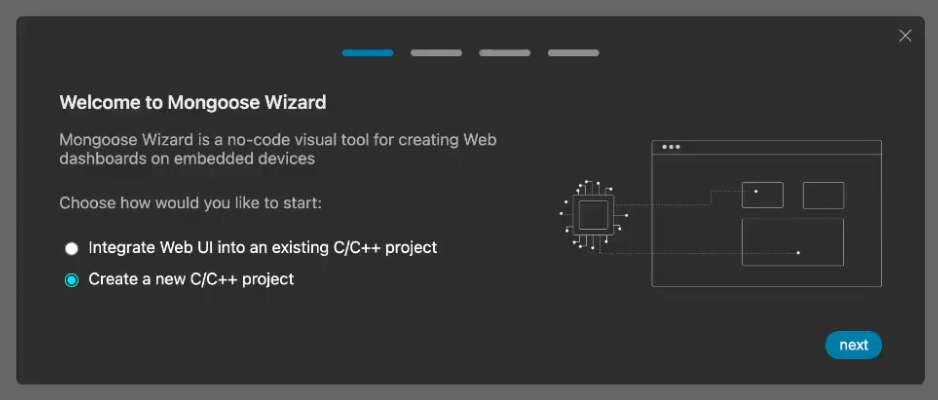
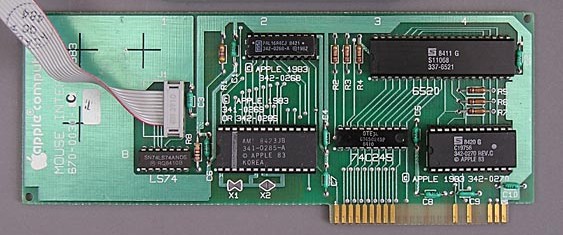




















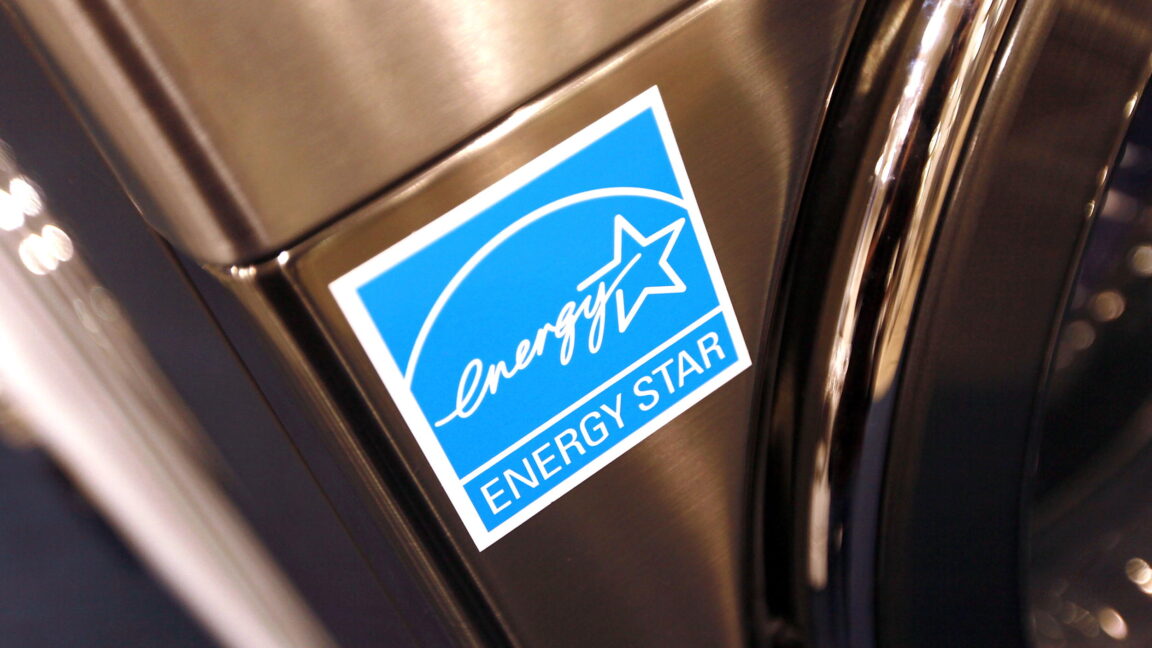



-xl.jpg)



























![Beats Studio Buds + On Sale for $99.95 [Lowest Price Ever]](https://www.iclarified.com/images/news/96983/96983/96983-640.jpg)

![New iPad 11 (A16) On Sale for Just $277.78! [Lowest Price Ever]](https://www.iclarified.com/images/news/97273/97273/97273-640.jpg)
















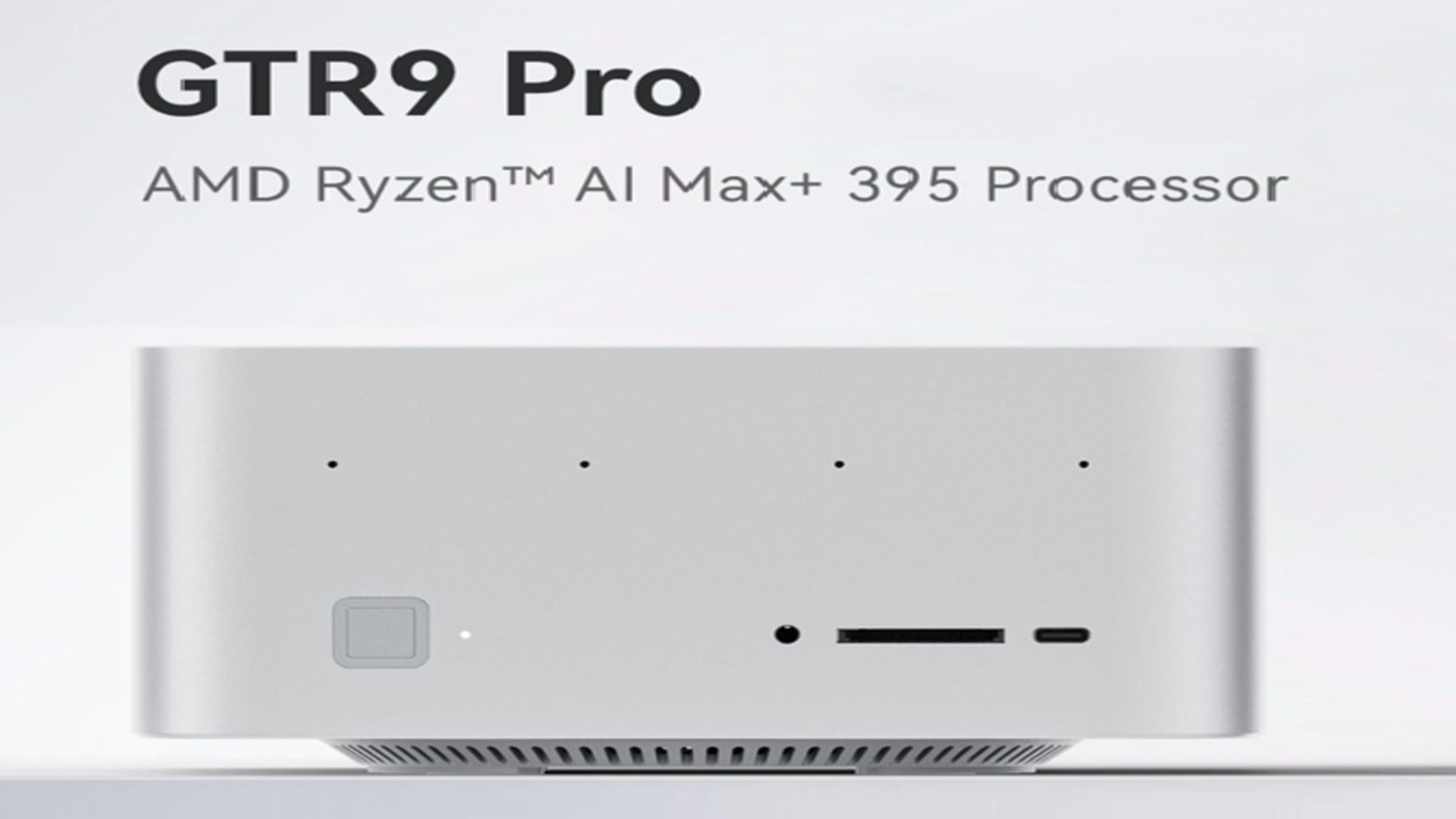






















![Apple's 11th Gen iPad Drops to New Low Price of $277.78 on Amazon [Updated]](https://images.macrumors.com/t/yQCVe42SNCzUyF04yj1XYLHG5FM=/2500x/article-new/2025/03/11th-gen-ipad-orange.jpeg)



![[Exclusive] Infinix GT DynaVue: a Prototype that could change everything!](https://www.gizchina.com/wp-content/uploads/images/2025/05/Screen-Shot-2025-05-10-at-16.07.40-PM-copy.png)



![T-Mobile discontinues a free number feature but a paid alternative exists [UPDATED]](https://m-cdn.phonearena.com/images/article/170235-two/T-Mobile-discontinues-a-free-number-feature-but-a-paid-alternative-exists-UPDATED.jpg?#)





















































